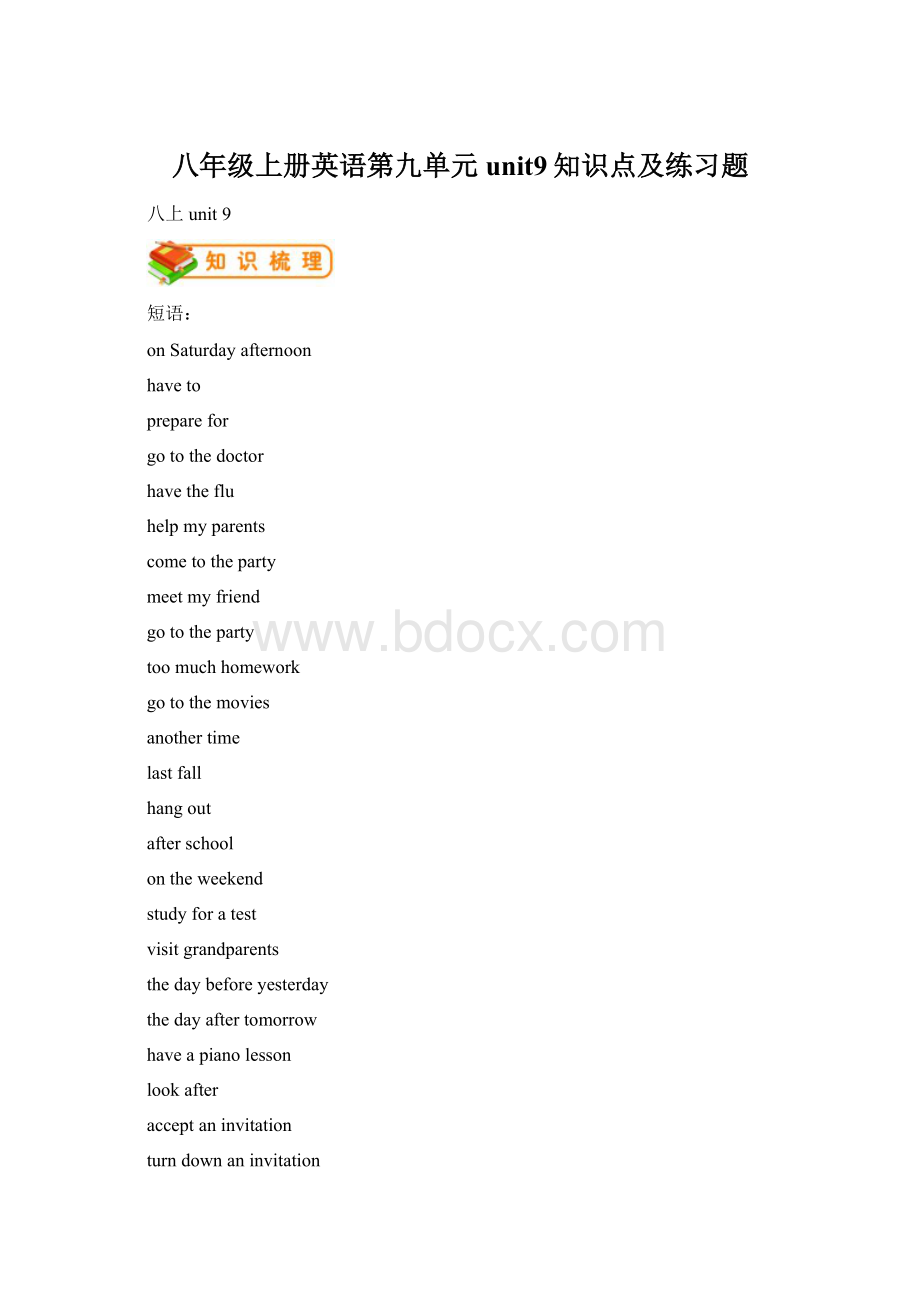八年级上册英语第九单元unit9知识点及练习题.docx
《八年级上册英语第九单元unit9知识点及练习题.docx》由会员分享,可在线阅读,更多相关《八年级上册英语第九单元unit9知识点及练习题.docx(29页珍藏版)》请在冰豆网上搜索。

八年级上册英语第九单元unit9知识点及练习题
八上unit9
短语:
onSaturdayafternoon
haveto
preparefor
gotothedoctor
havetheflu
helpmyparents
cometotheparty
meetmyfriend
gototheparty
toomuchhomework
gotothemovies
anothertime
lastfall
hangout
afterschool
ontheweekend
studyforatest
visitgrandparents
thedaybeforeyesterday
thedayaftertomorrow
haveapianolesson
lookafter
acceptaninvitation
turndownaninvitation
takeatrip
attheendofthismonth
lookforwardto
theopeningof
replyinwriting
goshopping
dohomework
gototheconcert
not…until
短语用法:
invitesb.todosth.What+a/an+形容词+可数名词单数(+主语+谓语)!
helpsb.(to)dosthWhat+形容词+名词复数/不可数名词(+主语+谓语)!
besadtodosth.seesbtodosth/seesbdoingsth
thebestwaytodosth.haveasurprisepartyforsb
lookforwardtodoingsth.replytosth/sb.
What’stoday?
What’sthedatetoday?
Whatdayisittoday?
词语辨析:
1.prepare意为“准备”,强调准备的动作与过程。
宾语是这一动作的承受者。
其后也可接双宾语,还可接不定式。
prepareforsth.为…准备好。
for的宾语不是动作的承受者,而是表示准备的目的,即所要应付的情况。
/preparetodosth准备做某事。
prepare强调准备的动作与过程。
宾语是这一动作的承受者。
其后也可接双宾语,还可接不定式。
get/beready意为“准备好”,强调准备的结果。
常见结构有:
①beready(forsth.)②getsth.ready③beready(forsth)④begetreadytodo(准备干某事,乐于干某事)
(1)We_____themid-termexamination.
(2)MissLisaid,“Everyoneshould______beforeclass.
2.havetheflu患感冒haveacold感冒haveacough咳嗽haveafever发烧haveasorethroat喉咙痛haveaheadache头痛haveatoothache牙痛
3.hangout常去某处,泡在某处hangon紧紧抓住hangabout闲荡hangup挂电话,悬挂,挂起
4.catchyou=byebyecatchacold感冒catchsb’seye引起某人注意catchthetrain赶上火车
catchupwith赶上,,跟上catchholdof抓住
5.accept接受,反义词为:
refuse。
accept指主观上愿意接受,receive收到,指客观上收到或拿到,但主观上不一定会接受。
Ireceivedhisgiftyesterday,butIwouldn’tliketoacceptit.
6.turndown=refuse拒绝turnup放大,调高turnover翻身taketurns依次,轮流
7.helpsb.(to)dosth帮助某人做某事helpsb.withsth在某方面帮助人helponeselftosth随便吃
8.attheendof在…末尾,在…尽头,bytheendof到…末为止intheendof终于
9.surprised形容词,主语是人besurprisedtodosth对做某事感到意外
surprising形容词,令人惊讶的,主语是物Thenewswassurpring.
surprise名词,惊奇、惊讶toone’ssurprise动词,使惊奇,使感到意外Itsurprisesbtodosth.
10.lookforwardto期待,盼望,to是介词,后跟名词,代词或动名词作宾语。
hearfromsb.收到某人的来信=receivealetterfromsb.
hearof=hearabout听说
11.makeit在约定的时间内到达,能够来=arriveintime;Gladyoucouldmakeit.
商量确定的时间,表示将来某项计划的安排,后接时间状语。
Let’smakeitatseveno’clockonTuesday.
成功办成某事=succeedAfteryearsofhardwork,hefinallymadeit.
12.reply回答,指用口头或书面形式回答,不及物动词replytosb/sth.对…..作出回答。
作及物动词,意为回答,回答说。
作名词,意为:
答道,回信,答复,后跟介词to.
answer是最普通的用语,包括口头,书面或行动的回答,可作及物和不及物动词。
1.Susanfeltreally (surprise)atthesurprisingnews.
2.I'mlookingforwardto mygrandparentsinsummer.
A.
visit
B.
visiting
C.
visitting
D.
visited
3.Iheard mybrotherlastweek.
A.
of
B.
from
C.
for
D.
with
4.Whenyouleavethereadingroom,youshouldrememberto thelights.
A.
turnon
B.
turndown
C.
turnoff
5.--- delicioustheicecreamis!
Couldyougivemeonemore?
---Sure.
A.
What
B.
How
C.
Whata
解析:
surprised形容词,主语是人besurprisedtodosth对做某事感到意外
surprising形容词,令人惊讶的,主语是物Thenewswassurpring.故选surprised。
解析:
lookforwardtodoingsth.故选B。
解析:
hearof:
听说;hearfrom:
收到某人的来信,故选B。
解析:
turndown=refuse拒绝turnup放大,调高turnover翻身
taketurns依次,轮流turnon:
打开;turnoff:
关上,故选C。
解析:
what+名词感叹;how+形容词表感叹,故选B。
情态动词用法归纳
情态动词有can(could),may(might),must,haveto,shall(should,will(would),dare(dared),need(needed),oughtto等。
情态动词无人称和数的变化;不能单独使用,必须与其后的动词原形构成谓语
一、can,could
1)表示能力(体力、知识、技能)。
Canyouliftthisheavybox?
(体力)
Marycanspeakthreelanguages.(知识)
Canyouskate?
(技能)
此时可用beableto代替。
Can只有一般现在时和一般过去式;而beableto则有更多的时态。
I’llnotbeabletocomethisafternoon.
当表示“经过努力才得以做成功某事”时应用beableto,不能用Can。
如:
Hewasabletogotothepartyyesterdayeveninginspiteoftheheavyrain.
2)表示请求和允许。
----CanIgonow?
-----Yes,youcan./No,youcan’t.
此时可与may互换。
在疑问句中还可用could,
might代替,不是过去式,只是语气更委婉,不能用于肯定句和答语中。
----CouldIcometoseeyoutomorrow?
----Yes,youcan.(No,I’mafraidnot.)
3)表示客观可能性(客观原因形成的能力)。
They’vechangedthetimetable,sowecangobybusinstead.
Thishallcanhold500peopleatleast.
4)表示推测(惊讶、怀疑、不相信的态度),用于疑问句、否定句和感叹句中。
Canthisbetrue?
Thiscan’tbedonebyhim.
Howcanthisbetrue?
二、may,might
1)表示请求和允许。
might比may语气更委婉,而不是过去式。
否定回答时可用can’t
或mustn’t,表示“不可以,禁止”。
----Might/MayIsmokeinthisroom?
----No,youmustn’t.
----May/MightItakethisbookoutoftheroom?
----Yes,youcan.(No,youcan’t/mustn’t.)
用MayI...?
征徇对方许可时比较正式和客气,而用CanI...?
在口语中更常见。
2)用于祈使句,表示祝愿。
Mayyousucceed!
3)表示推测、可能性(不用于疑问句)。
might不是过去式,它所表示的可能性比may小。
1.Hemay/mightbe